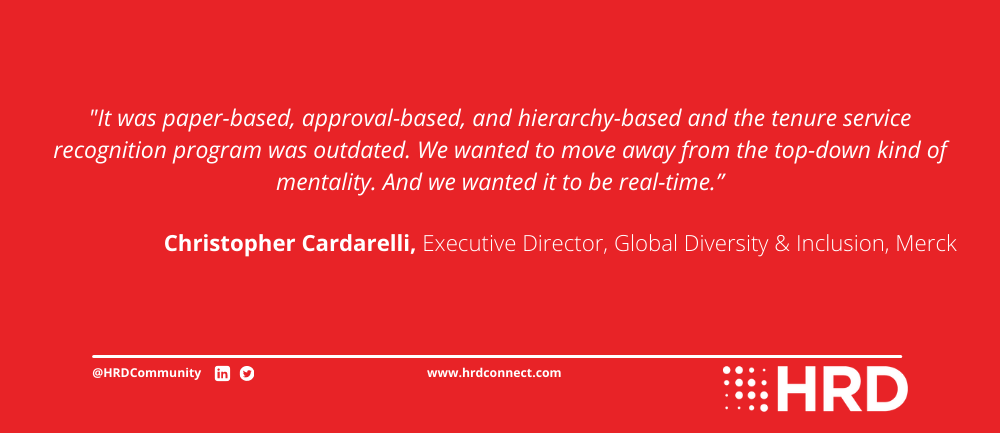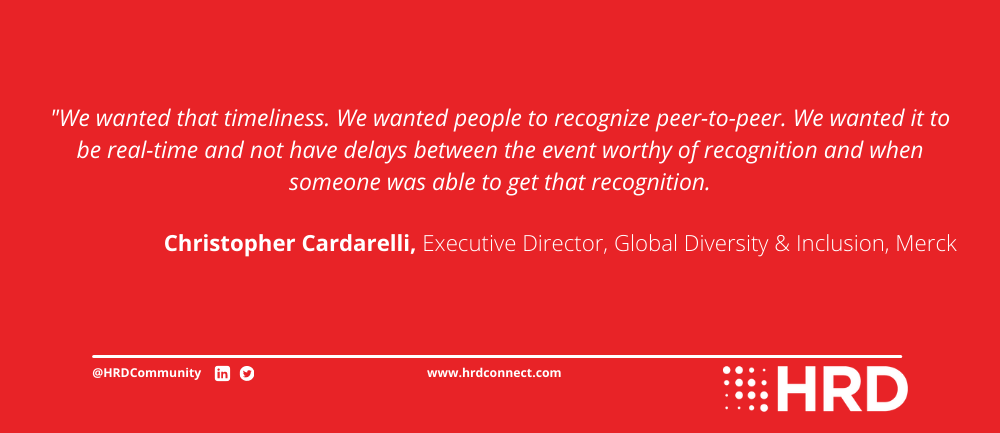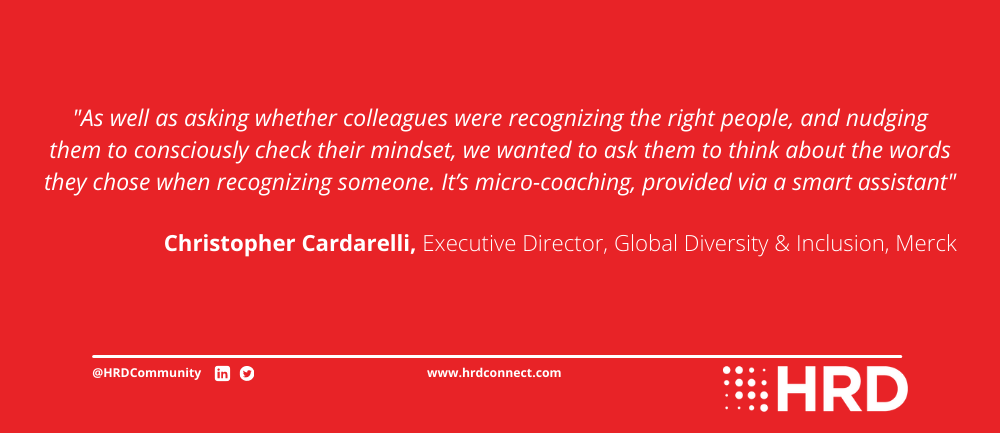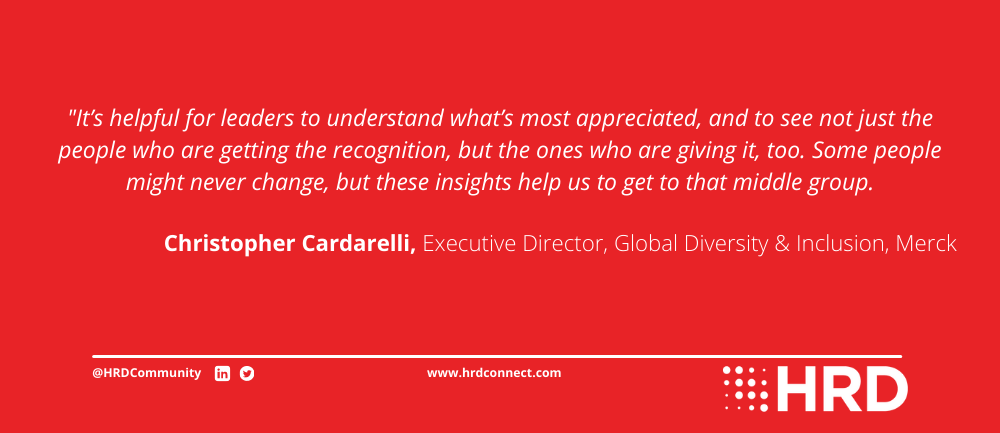-
Provided by

- Date published: May 29, 2023
- Categories
Recognition is as important to the new normal as watercoolers and work drinks were to the old. They turn our colleagues into confidantes, managers into mentors, and give a smiling face to our inclusive rhetoric.
In many cases, however, feedback loops are still stuck in the last century. Companies are struggling to refit their recognition model for digital working, and the result is high employee turnover, low engagement, and spiraling recruitment costs.
But Merck, one of the world’s biggest pharmaceutical companies, is determined to break this cycle – and rebuild it, better.
Partnering with a global employee recognition platform, Merck rolled out a modern recognition and reward programme which has boosted employee retention and recruitment, and driven decisive progress toward diversity, equity and inclusion (DE&I) metrics.
The new platform has empowered employees to praise one another, with minimal hold-ups along the way. Everyone now has a voice.
Employees at Merck have generated more than 3 million ‘recognition moments’ since the program went live. At one point Merck was delivering a new recognition message every 23 seconds.
“We’ve gone from a system that was not timely, heavily process and approval driven, time-intensive and capacity-intensive, one that couldn’t scale, to one that allows everyone to enable recognition to flow more regularly and meaningfully,” says Christopher Cardarelli, Executive Director, Global Diversity & Inclusion, and one of the champions of the program overhaul.
“We’ve empowered everyone to give recognition, and the entire company can now see how much words matter.”

Recognition revamped: Out with the old
Previously, Merck’s recognition process and system was paper-based. It was totally out of sync with the needs of the modern remote worker.
What’s more, the recognition was subject to top-down approvals. Then, when the company provided rewards, the complexities of local tax and customs regulations snarled them up.
The system was so inefficient that only around 20 percent of colleagues were receiving recognition. Christopher says the entire system was “cumbersome” and went against the culture of curiosity that Merck is striving to build.
“You needed to be sure that your manager was supportive, and the other employee’s manager was supportive. There were forms, documents, and submissions, waiting on approval. It was paper-based, approval-based, and hierarchy-based and the tenure service recognition program was outdated.
“We wanted to move away from the top-down kind of mentality. And we wanted it to be real-time.”

A new approach to appreciation and celebration
So, Christopher and his colleagues began looking for alternatives.
In Merck’s upgraded approach to recognition, awarders can select from award categories that the platform has tailored specifically to Merck’s values and send their recognition messages via video or text. The platform delivers the message to the recipient as a push notification, removing the paper trail completely. The sender can also add a certain number of points, which the recipient can use to claim rewards; to ensure the project stays on budget, each colleague has a threshold for the number of points they can provide, based on their seniority.
“We wanted that timeliness,” Christopher explains when discussing the choice of platform, known as INSPIRE. “We wanted people to recognize peer-to-peer. And for it to be real-time and not have delays between the event worthy of recognition and when someone was able to get that recognition.
“The system allows us to catalog milestones and translate points to a dollar value. Amazon, Apple… there’s a significant number of places one can use those points, based upon what is most important to them.”

Micro-coaching modules for inclusive recognition
Merck has embedded two micro-coaching modules within the program: Workhuman’s Inclusion Reflections and Inclusion Advisor. The first encourages employees to nominate their peers and takes them through the process, ensuring that each recipient receives an equitable share of the praise.
The second, newer module is perhaps more intriguing. Harnessing AI, it flags potentially problematic and exclusionary language to tackle unconscious bias. Once an employee writes their recognition message and prompts the program, Inclusion Advisor can scan their message for bias and suggests more inclusive alternatives.
For example, if the awarder were to write an award message to their co-worker and describe her as “a role model for other women”, the AI will flag this phrase as potentially problematic, as it limits the recipient’s impact to their immediate demographic.
Likewise, the software will warn awarders against highlighting a sacrifice made by a recipient (for example, giving up their weekend) as this may imply that the recipient made an unusual effort to get rewarded. The AI does not oblige the awarder to make the suggested change. It is simply giving them food for thought.
“When you’re recognizing employees, are you equitable in your allocation of your recommended award? Are you leaving anyone out? If you’re allocating points to one person more than another, does that make sense?
“So, as well as asking whether colleagues were recognizing the right people, and nudging them to consciously check their mindset, we wanted to ask them to think about the words they chose when recognizing someone. It’s micro-coaching, provided via a smart assistant.
“Our ways of working are intended to be aspirational. They range from embracing diversity and inclusion to winning as one team. These values are foundational to how we want to drive culture.”

How INSPIRE continues to shift behavior at Merck
Beyond the raw numbers and the sheer weight of comments that Merck’s employees have passed through the synapses of its new digital system, Christopher is extremely excited about the feedback he has received on the system itself.
“The feedback from those who are embracing this was ‘that was helpful. I never thought about how much words matter when I write an email.’ Although the suggestions [from the AI micro-coach] were not compulsory, data from our program indicated that of those who checked the tool and received a prompt, 75% shifted their words and made a change to the way they gave recognition.”
There’s been plenty of praise from outside the company, too. Groups including Seramount and Fortune have named Merck as a best place to work for diversity, multicultural women, and LGBTQ equality. But Christopher and his colleagues aren’t resting on their laurels. In fact, Merck is only just starting to take full advantage of the data from their new platform.
“Now, we can build reports. I personally downloaded a report from my team. I could see all the recognition they received over the course of the year.
“It’s helpful for leaders to understand what’s most appreciated, and to see not just the people who are getting the recognition, but the ones who are giving it, too. Some people might never change [the way they recognize others], but these insights help us to get to that middle group.
“We can go deeper to shift behavior.”



